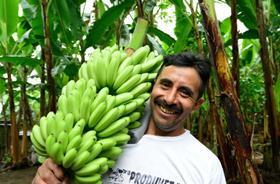
The intensifying impacts of climate change pose a serious risk to global agricultural production and directly threaten the livelihoods of millions of Fairtrade farmers around the world, a new Fairtrade study has revealed.
The report added that increased investment in climate adaptation and resilience measures are critical if falling incomes for Fairtrade farmers are to be prevented.
Released ahead of the 2021 United Nations Climate Change Conference, also known as COP26, the report, titled Fairtrade and Climate Change was conducted by researchers from VU Amsterdam and Bern University of Applied Sciences.
The report paints a bleak picture of the future of key products including bananas, coffee, and cocoa, and explicitly identifies how climate change will impact specific crops and regions in different ways.
Supported by funding from the European Union, the study suggests that millions of farmers could be at risk of financial collapse as their livelihoods come under increasing climate pressure.
“The report’s results are extremely alarming and a clarion call for immediate and comprehensive climate action,” warned Dr Nyagoy Nyong’o, Global CEO at Fairtrade.
“The threat to the future of many supply chains is very real and our planet’s farmers and agricultural workers are on the frontline of this global climate crisis,' she added. 'We must do everything to ensure they are not left behind and that they are indeed a part of the solution.”
According to the study’s findings, dramatic weather patterns spurred by climate change will likely deliver severe blows to agricultural production in key regions around the world, from Latin America to the Asia-Pacific.
Banana producers in the Caribbean and in Central America, for instance, are expected to face less rainfall and more extreme temperatures, while those in Southeast Asia and Oceania will see an increased risk of tropical cyclones.
“The way climate change affects the planet is extraordinarily complex,' said Juan Pablo Solís, Fairtrade’s senior advisor for climate and environment.
'This report offers an amazing amount of climate data and projections that illustrate the reality of those landscapes where farmers and workers are producing under Fairtrade terms and the mounting challenges that they face if the international community continues to fail them,” Solís outlined.
Fairtrade has in recent years strengthened its Standards requirements and increased the programmatic focus on environmental issues and climate change through its Fairtrade Climate Academies and targeted projects with Fairtrade producers.
Nevertheless, Solís noted that the magnitude of the climate crisis called for “more and wider partnerships to support farmers to jointly face the massive challenges ahead'.
“The international community must rally around farmers and engage head-on in climate action,” Solís added. “And this must be done through supporting climate adaptation and resilience measures to ensure that both farmers’ livelihoods are protected and the environment is preserved.”



